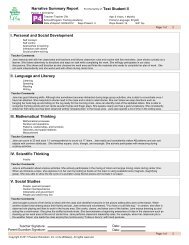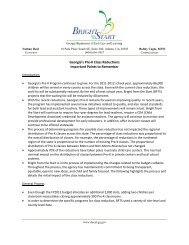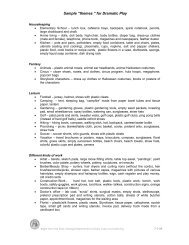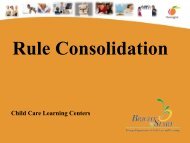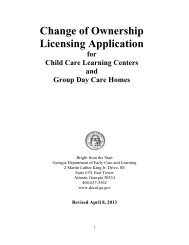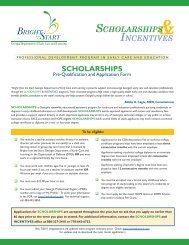Georgia's Pre-K Program - FPG Child Development Institute ...
Georgia's Pre-K Program - FPG Child Development Institute ...
Georgia's Pre-K Program - FPG Child Development Institute ...
You also want an ePaper? Increase the reach of your titles
YUMPU automatically turns print PDFs into web optimized ePapers that Google loves.
26 Georgia Study of Early Care and Education: Findings from Georgia’s <strong>Pre</strong>-K <strong>Program</strong><br />
Georgia’s <strong>Pre</strong>-K teachers and assistant teachers need continued training and technical<br />
assistance to support high quality classroom practices that will positively affect<br />
children’s development and learning. Findings from this study suggest that most<br />
Georgia’s <strong>Pre</strong>-K lead teachers have a Bachelor’s degree and that both teachers and<br />
assistant teachers participate in several hours of in-service each year, covering many<br />
topics. Their education and training have not yet translated into consistently high<br />
quality classroom practices. Thus, Georgia’s <strong>Pre</strong>-K teachers and assistant teachers<br />
may benefit from more effective or extensive professional development. Training that<br />
includes empirically supported features such as content focus, active learning, and<br />
sufficient duration may be more effective. 23, 24, 25, 26 On-site technical assistance also<br />
may be useful in providing ongoing support to teachers to ensure that they have the<br />
depth of understanding and skills needed to translate knowledge into practice in the<br />
classroom. 27<br />
Georgia’s <strong>Pre</strong>-K <strong>Program</strong> has many strengths that form a strong foundation<br />
from which to work. Almost all programs used a curriculum and assessed children<br />
as a means to plan instruction. Many schools and some centers had a Resource<br />
Coordinator, allowing them to provide additional supports to children and their<br />
families. The majority of directors/principals and teachers had a Bachelor’s degree,<br />
many with a major in early childhood, which should allow them to take advantage<br />
of high-level professional development and technical assistance opportunities.<br />
Most pre-k classrooms were rated as providing a medium level of global quality and<br />
providing an environment that was very organized and supportive of children’s<br />
emotional development. This means that leaders can focus less on the basics of<br />
general care and education and more on the particular aspects of high quality care and<br />
education—especially instructional support—that are related to children’s outcomes.<br />
In closing, Bright from the Start: the Department of Early Care and Learning<br />
should be commended for conducting a statewide representative study of<br />
child care and Georgia’s <strong>Pre</strong>-K. The study provides objective information about the<br />
range of quality in centers and pre-k programs across the state. Georgia was a pioneer<br />
in the pre-kindergarten movement in the U.S., and Georgia’s leaders have worked hard<br />
over the years to move toward a universal, voluntary program that supports children’s<br />
success in school. It may be easier to provide high quality in a smaller program, so<br />
Georgia leaders should not be surprised that there are challenges in maintaining high<br />
standards as the program has grown. We hope that these study findings will inform<br />
policymakers as they continue to support Georgia’s <strong>Pre</strong>-K <strong>Program</strong>, particularly in<br />
identifying areas of needed improvement and relative strengths on which to build.










